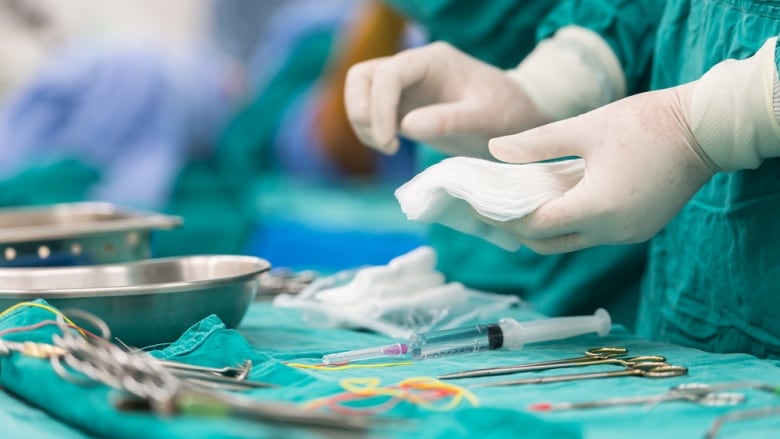Winnipeg open heart surgery patients warned of potential infection risk
Device used in cooling, warming blood during surgery carries low risk of contamination, infection

The Winnipeg Regional Health Authorityis warning open heart surgery patients after bacterial infections have been linked to a device that is commonly used in the operating room.
On Oct. 13, the U.S. Centers for Disease Control and Preventionadvised hospitals about a link made between bacterial infections and a piece of equipmentused to heat and cool blood during open heart surgery.
Dr. Rakesh Arora, a cardiac surgeon with the health authority's cardiac sciences program, said the infection is caused by Mycobacterium chimaera, a bacteria type also known as non-tuberculosis mycobacteria.
Arora said the bacteria grows slowly and it can take weeks, months or even years forsymptoms to pop up.
The Centers for Disease Control pegged the risk of infection at less than one per cent. The Winnipeg Regional Health Authority is not aware of any confirmed cases of infection in Manitoba, although two have been reported by the Montreal Heart Institute.
"The chances of getting this infection are very low. Most patients will benefit much more from the surgery than delaying it for any risk of infection," Arora said.
"However, in an abundance of caution, St. Boniface Hospital and the cardiac sciences program are contacting all patients who have had heart surgery since 2012."
About 250,000 open heart surgeries are carried out around the world every year, and the device is used in about 60 per cent of cases in North America, Arora said.
"These are used ubiquitously in surgeries all around the world," Arora said. "The current recommendations are to continue using the products. There's no real good way to change them and alter the way we do business in the operating room."
There have been more than 4,300 open heart surgeries in the past four years in Manitoba, the majority at St. Boniface Hospital.
'A little bit disturbing'
Notes to patients and doctors were sent out Monday and included a list of key symptoms, Arora said. Symptoms may include night sweats, weight loss, muscle aches, fatigue, fever, redness or heat around the point of incision.
Lucien Loiselle had heartsurgeryin 2013, as did his wifein 2014. Hesaid heisn't overly worried by the announcement.
"It's ... a little bit disturbing," he said. "But at the same time ... the possibilities of infections are very slight."
Neither he nor his wife have experienced any of the symptoms listed by St. Boniface, Loiselle said.
"Some of the symptoms seem to be quite common," he said."It's just a wait and see game."
Dr. Brock Wright, chief medical officer for the Winnipeg Regional Health Authority, said Winnipeg was "well ahead of the curve" in notifying patients of the potential infection risk compared to other jurisdictions.
Still an 'essential' tool
The device remains an "essential" tool that continues to be used in open heart surgeries at St. Boniface Hospital, Arora said, adding hospital staff have been following the manufacturer's directions for cleaning the machine to minimize infection risk.
"It's difficult to know if your machine is infected or not," he said. "There's a deep cleaning procedure we're using locally to help minimize any risk within the device."
Arora said the prevailing belief at this point is that a piece of the device has been contaminated during the manufacturing process, which has allowed the bacteria to grow in rare cases.
The bacteria is found in water and soil and is very common, Arora said.The devices all come with the same components, with water inside that is circulated to help control blood temperature.
Arora said while there are serious health risks associated with infection, patients can be successfully treated if the condition is accurately diagnosed.
Health Canada has also released an advisory stating all of the devices, regardless of manufacturer, are at risk of infection.
The Winnipeg Regional Health Authority and St. Boniface Hospital encouraged patients with any concerns to contact their family doctor or call the cardiac clinic line at 18773580426.












_(720p).jpg)


 OFFICIAL HD MUSIC VIDEO.jpg)
.jpg)



























































































